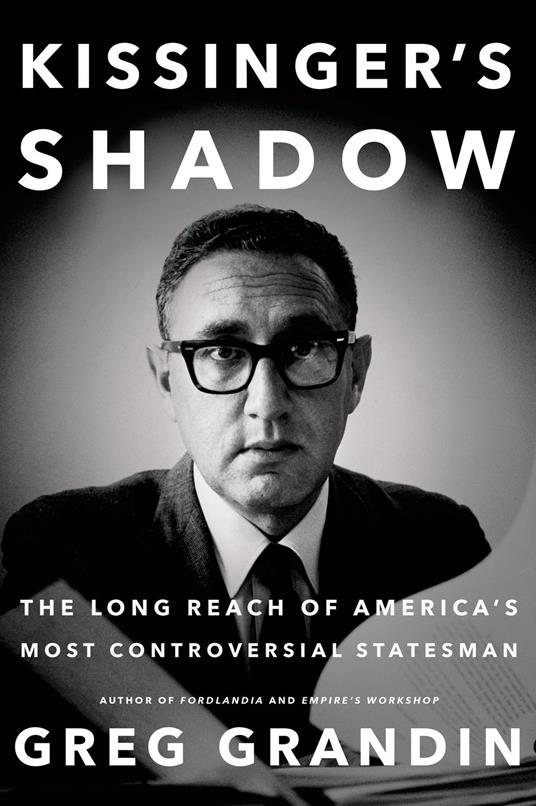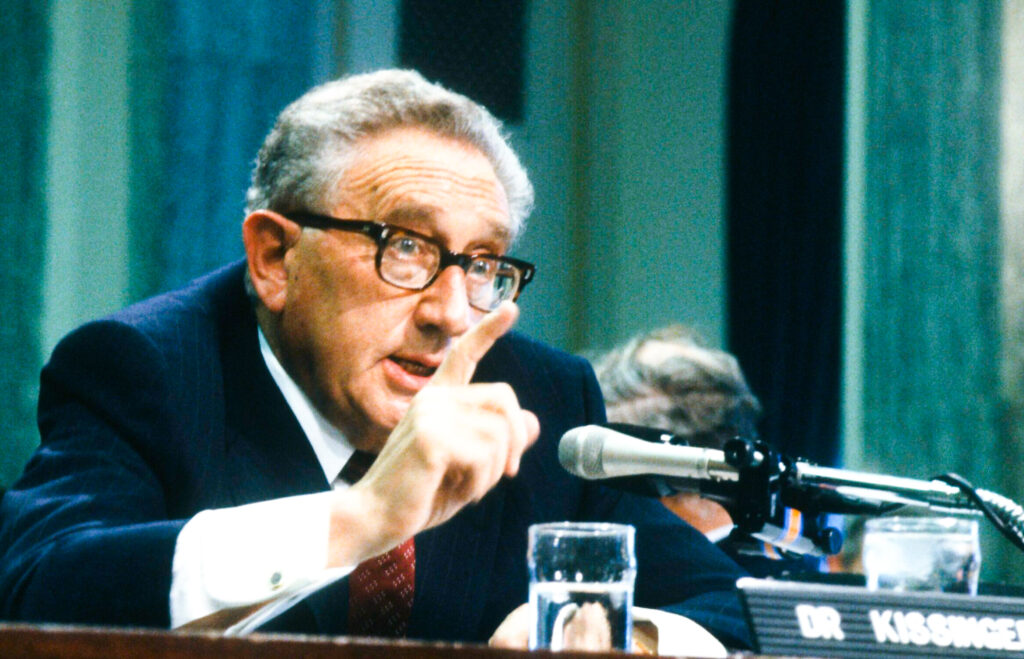Thiomas Fazi je ob smrti Henryja Kissingerja naredil odličen pregled “lika in dela” verjetno najbolj kontroverznega ameriškega diplomata oziroma snovalca ameriške zunanjepolitične strategije v času hladne vojne. Ima ogromno minusov (vse vojne, v katerih je v imenu boja proti komunizmu umrlo milijone nedolžnih ljudi in vsi državni prevrati, v boju za prevlado ameriškega imperializma, običajno zamaskiranega z bojem proti komunizmu) in nekaj plusov (stabilizacija odnosov s Sovjetsko zvezo in vzpostavitev odnosov s Kitajsko, nekaj dobro napisanih knjig).
Ključno vprašanje za zgodovino glede njegove dediščine je, ali ti plusi prevagajo nad minusi. Za amerofile in konzervativne politike in zgodovinarje (tipa Niall Ferguson) je sicer vprašanje bistveno bolj preprosto, in sicer: ali je posledice njegovih brutalnih političnih dejanj (v obliki milijonov mrtvih nedolžnih ljudi in desetin strmoglavljenih vlad) mogoče upravičiti s “svetim bojem proti komunizmu“. In njiohov odgovor je seveda: Itak.
Kar se mene tiče, je bil ta “sveti boj proti komunizmu” zgolj maska za prevlado ameriškega globalnega imperializma. Boj za ameriške strateške politične in ekonomske interese, ki so jih ameriške administracije lepo zapakrirale v propagando boja dobrega (liberalnega kapitalizma) nad slabim (avtonomnim političnim sistemom, avtokratskim ali ne). No, ampak glede tega je danes Biden-Blinknova zunanja politika enako brutalno “kissingerjanska” in celo bistveno bolj nevarna, kajti išče globalni spopad z velesilama Rusijo in Kitajsko, čemur pa se je Kissinger eksplicitno izogibal in se tudi izognil.
Henry Kissinger has died. Here’s everything you need to know about America’s most controversial and polarising statesman — ruthless imperialist and diplomatic genius at the same time.
1/ As National Security Advisor and Secretary of State from 1969 to 1977 under Presidents Richard Nixon and Gerald Ford, Kissinger played a pivotal role in marshalling the United States through one of the Cold War’s most violent and turbulent decades. 
2/ What one chooses to emphasise about Kissinger’s political record depends on where one sits in the “Kissinger wars”. According to his detractors, Kissinger was above all an imperialist who pursued US global supremacy with unmatched ruthlessness and cynicism. 
3/ In “The Trial of Henry Kissinger”, Christopher Hitchens famously called for his prosecution “for war crimes, for crimes against humanity, and for offences against common or customary or international law, including conspiracy to commit murder, kidnap, and torture”. 
4/ The book was also made into a documentary, which you can watch here:
5/ The crimes (in the moral if not the legal sense) outlined by Hitchens and others include:
– Kissinger’s support for Pinochet’s violent overthrow of Allende’s socialist government in Chile and for the murderous 17-year-long dictatorship that followed. thenation.com/wp-content/upl…

6/ – Kissinger’s support for the equally brutal Argentinian military junta of Jorge Videla, which came to power in a coup in 1976, and the latter’s campaign of state terrorism against the country’s left-wing forces which left thousands dead or disappeared.
7/ – Kissinger’s enabling and encouragement of the Indonesian invasion and occupation of East Timor, in 1975, and the subsequent genocidal campaign which resulted in the deaths of nearly a quarter of the Timorese population (around 200,000 civilians).
8/ – Kissinger’s support for Pakistan in its war with India over Bangladesh, in 1971, and his deliberate collusion in the Pakistani military’s and paramilitary’s genocide of at least 1.5 million Bangladeshi. 
9/ – And, most infamously, Kissinger’s encouragement of Nixon’s secret bombing campaign against neutral Cambodia and Laos, following his “savage” (Kissinger’s word) bombing of North Vietnam, which killed an estimated 150,000 civilians in Cambodia alone. 
10/ What came to be known as the Kissinger Doctrine was pretty straightforward: the US essentially reserved itself the right to intervene anywhere in the world in defence of its interest, including by conspiring against democratically elected governments.
11/ So wide-ranging was US interventionism under Kissinger, effectively spanning every corner of the globe, that in 1976 the then-thirty-three-year-old senator Joe Biden accused Kissinger of trying to promulgate “a global Monroe Doctrine”.
12/ Of all the offenses committed by Kissinger, the Indochina bombing campaign, which involved the deliberate mass killing of civilian populations, is probably the most damning. The almost mind-boggling scope of the destruction is well described in Pulitzer-winner Grandin’s book. 
13/ Just to give one example, there are 80 million unexploded cluster bombs in Laos that are still maiming and killing hundreds of people, often children, every year.
14/ Overall, when one considers the almost endless list of horrors suffered by Third World peoples on the receiving end of Kissinger’s “grand strategy”, it is hard to disagree with Hitchens’s conclusion that…
15/ … Kissinger’s actions reveal a “a callous indifference to human life and human rights” — and to democracy, one may add. “I don’t see why we have to stand by and watch a country go communist because of the irresponsibility of its own people”, he once observed of Chile.
16/ In comparison to his foreign policy, Kissinger’s penchant for harassing, humiliating, cutting out and spying on his own colleagues and staff — which Pulitzer Prize-winner Seymour Hersh exposed in his 1983 book The Price of Power — looks like a minor misdemeanour. 
17/ With his reputation largely (and questionably, as Hersh argued) untainted by Watergate, Kissinger went on to found, in 1982, his own lucrative geopolitical consulting firm, Kissinger Associates, which he continued to run up to his death.
18/ We know relatively little of the work it carries out. Several attempts have been made, at the congressional level, to get the company to hand over its secretive “client list” — but all have failed.
19/ It is no secret however that Kissinger used his extensive knowledge of and close relationship with foreign governments — including, one must presume, the several dictatorships he helped come to power — to advance the interests of some of the world’s largest corporations.
20/ Up until now we have considered the viewpoint of the Kissinger-as-evil-mastermind camp. At the other end of the ideological spectrum we find the Kissinger-as-diplomatic-genius camp, whose most illustrious representative is probably historian Niall Ferguson.
21/ For authors such as Ferguson, Kissinger’s crimes were justified in the name of the Holy War against communism — which America after all, won. The burden of proof is on critics to show how different policies “would have produced better results”.
22/ More convincingly, Kissinger’s defenders focus on his diplomatic achievements: America’s détente with the Soviet Union; the normalisation of US-China relations; an Arab-Israeli truce following the 1973 Yom Kippur War; and the Paris Peace Accords to end the Vietnam War.
23/ So, was Kissinger an arch-imperialist or an arch-peacemaker? In a sense, he was neither. Both sides of the Kissinger wars tend to overemphasise his influence on US foreign policy during the Seventies, ignoring the deeper systemic trends at play.
24/ Insofar as Kissinger’s aggressive interventionism is concerned, this should be situated within the grander picture of the “structural” violence that has always characterised the American Empire — both before and, alas, after he was in office.
25/ Similarly, Kissinger’s diplomatic efforts also need to be situated within the wider “realist” consensus that dominated US policymaking during the Cold War. This framework took for granted that the US should pursue its interests, even ruthlessly so, but was also aware…
26/ … that the “multipolar” reality of the Cold War meant striking some kind of balance between America and other established (the Soviet Union) or ascending (China) powers, especially in the age of nuclear weapons.
27/ From a different perspective, however, one could also argue that both camps are right: Kissinger was (is) both an imperialist and a realist — an “imperealist”, one might say. This put him at odds with the neoconservatives now running the US foreign policy establishment.
28/ In recent years, for example, he repeatedly railed against America’s confrontational approach towards Russia and China, warning against the risk of a new Cold War — one that is now all but underway.
29/ This is perhaps the most disheartening part of this story: as destructive as Kissinger’s policies may have been, the current mix of aggressive imperialism and moralistic democracy-versus-authoritarianism Manicheism (à la Biden) is just as brutal — but much more dangerous.
If you enjoyed this thread, check out the article it’s based on for a deeper dive:
.
Vir: Thomas Fazi, twitter

